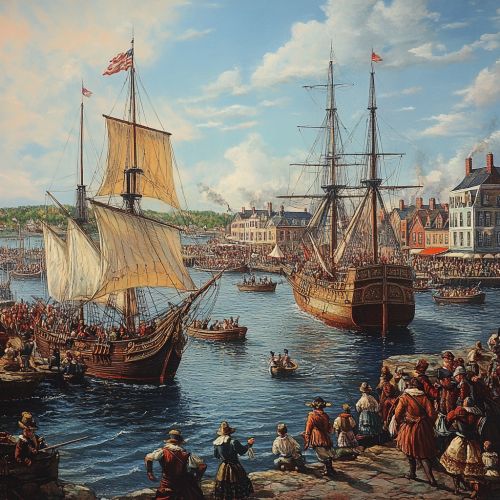Intolerable Acts
Background and Context
The Intolerable Acts, also known as the Coercive Acts, were a series of punitive laws passed by the British Parliament in 1774. These laws were enacted in response to the Boston Tea Party, an event that marked a significant escalation in the tensions between the American colonies and the British government. The Intolerable Acts were intended to assert British authority over the colonies and to punish Massachusetts for its defiance. However, they had the opposite effect, galvanizing colonial opposition and contributing to the outbreak of the American Revolutionary War.
The Acts in Detail
Boston Port Act
The first of the Intolerable Acts was the Boston Port Act, which came into effect on June 1, 1774. This act closed the port of Boston until the East India Company was compensated for the tea destroyed during the Boston Tea Party. The closure of the port had a devastating impact on the economy of Massachusetts, as Boston was a major hub for trade and commerce. The act was intended to isolate Boston and demonstrate the consequences of defying British authority.
Massachusetts Government Act
The Massachusetts Government Act significantly altered the governance of the colony. It revoked the colony's charter and brought it under direct control of the British crown. The act restricted town meetings to once a year unless the governor called for additional meetings, effectively stifling local governance. The act also allowed the governor to appoint most civil officials, further eroding colonial self-governance and increasing tensions between the colonists and the British authorities.
Administration of Justice Act
The Administration of Justice Act, often referred to by colonists as the "Murder Act," allowed royal officials accused of crimes in Massachusetts to be tried in other colonies or in Britain. This was perceived as a means to protect British officials from colonial justice, as it was believed they would receive more lenient treatment outside of Massachusetts. The act was seen as a denial of the colonists' right to a fair trial and further fueled anti-British sentiment.
Quartering Act
The Quartering Act of 1774 expanded upon previous legislation by allowing British troops to be housed in unoccupied buildings, including private homes if necessary. This act was deeply resented by colonists, as it was seen as an infringement on their rights and privacy. The presence of British troops in colonial homes was a constant reminder of British authority and control, exacerbating tensions between the colonists and the British military.
Quebec Act
Although not originally intended as part of the Intolerable Acts, the Quebec Act was passed in the same year and was perceived by the colonists as another coercive measure. The act extended the boundaries of Quebec and granted religious freedom to Catholics, which alarmed Protestant colonists. It also established a non-representative government in Quebec, which colonists feared could be a model for future governance in the American colonies.
Colonial Response
The Intolerable Acts were met with widespread outrage and resistance in the American colonies. The acts were perceived as a direct threat to colonial autonomy and liberties. In response, the colonies convened the First Continental Congress in September 1774, where representatives from twelve of the thirteen colonies gathered to coordinate a response to the British actions. The Congress issued a declaration of colonial rights and grievances and called for a boycott of British goods.


Impact on the American Revolution
The Intolerable Acts played a crucial role in uniting the colonies against British rule. The harsh measures imposed by the acts convinced many colonists that reconciliation with Britain was unlikely, and that independence was the only viable solution. The acts also served to galvanize support for the revolutionary cause, as they highlighted the extent of British oppression and the need for colonial unity.
The acts contributed to the outbreak of hostilities in April 1775, when British troops marched to Lexington and Concord to seize colonial military supplies. The ensuing battles marked the beginning of the American Revolutionary War, a conflict that would ultimately lead to the independence of the United States.
Legacy
The Intolerable Acts are remembered as a pivotal moment in American history, marking the point at which colonial resistance transformed into a full-scale revolution. The acts demonstrated the lengths to which the British government was willing to go to maintain control over the colonies, and the extent to which the colonists were willing to resist. The legacy of the Intolerable Acts is evident in the founding principles of the United States, which emphasize individual liberties and resistance to tyranny.
